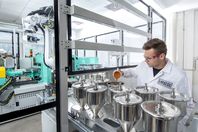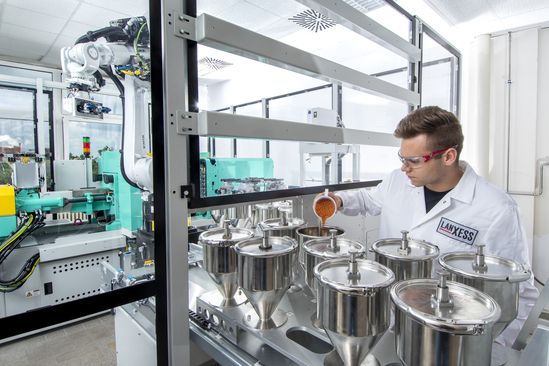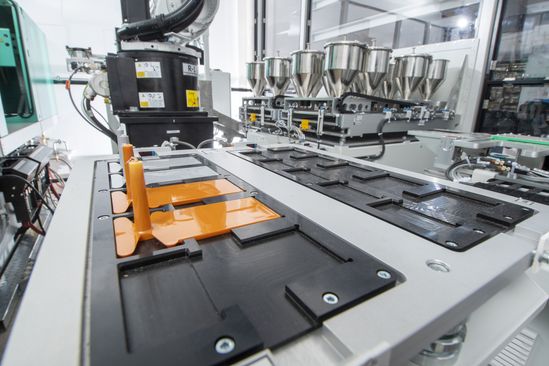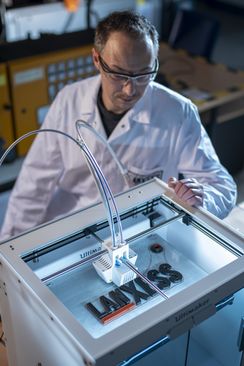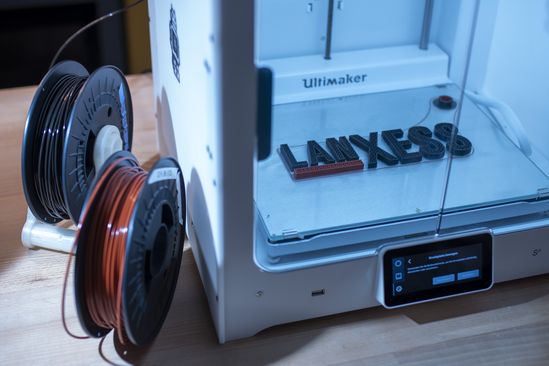Asia
EMEA

LANXESS Canada Contacts
Contact our Sites in Canada
Media Inquiries
General Inquiries
Please click here to e-mail LANXESS Canada with product inquiries and general requests.
Global Press Releases
2019-07-02
LANXESS expands technical customer services for the plastics industry
- Automated testing of thermal stability in customer-specific plastics applications
- Extensive pigment expertise for 3D printing
Cologne – Specialty chemicals company LANXESS has added to its technical services for pigment customers, with its Inorganic Pigments (IPG) business unit expanding the technical center at its biggest site in Krefeld-Uerdingen, Germany. The facility is now equipped to carry out automated measurements of thermal stability in customer-specific plastics applications. “From sample-loading to colorimetric analysis, all the necessary modules can be actuated via automated processes. That allows us to carry out highly specific tests with supreme accuracy,” said Stefano Bartolucci, global market segment manager for Plastics at IPG.
Experts on call for masterbatch coloring
LANXESS also offers extensive pigment expertise when it comes to coloring filaments for 3D printing. This promising digital technology has enormous potential for the plastics industry. The use of pigments for the production of filaments continues to gain popularity in the plastics industry.
At their laboratory in Uerdingen, LANXESS has the equipment to carry out in-depth tests on the effects of pigments, and the company is able to advise its customers on coloring with iron-oxide pigments. “For example, in the case of short dwell times and relatively low shear forces in the processing machines, it is necessary to ensure good dispersibility. The pigments need to be easy to distribute, and must reach their final color strength quickly,” explained Bartolucci. “At the same time, we can demonstrate ways of partially reducing the organic pigment content in a filament formulation by means of iron oxides, when the application calls for better weather stability.” In contrast to organic colorants, inorganic pigments provide high temperature and weather stability and yet relatively low costs, as well as excellent migration resistance.
Thermally stable Laux pigments
Iron-oxide pigments have been used to color plastics for decades, with great results. Red iron-oxide pigments in particular are often used as affordable alternatives to other options such as organic pigments. As the use of technical plastics such as polyamides, which can be processed at temperatures in excess of 260°C, becomes more and more widespread, the list of requirements for the pigments continues to grow. Their thermal stability in particular is becoming a decisive quality factor.
LANXESS offers the Colortherm brand, which features a range of synthetic red iron-oxide pigments that provide much better thermal stability than comparable pigments on account of their unique production process.
To manufacture these red types, LANXESS uses its proprietary Laux process, which involves heating the pigments to temperatures as high as 800°C. The process forces all traces of water that would make color shift more likely to occur out of the oxide crystal lattice. Consequently, the micronized LANXESS pigments exhibit no discernible color shift even at extremely high application temperatures. They can be processed at high temperatures well in excess of 300°C with no problems at all.
LANXESS is adding a splash of color to the world of plastics
LANXESS is the world’s largest manufacturer of iron-oxide pigments, and also one of the leading producers of chrome oxide pigments. At K 2019, the leading international trade show for the plastics and rubber industry which takes place in Düsseldorf from October 16 to 23, the company will be presenting its comprehensive range of Colortherm inorganic pigments for coloring plastics. “Our range of products includes both all-rounders and specialists aimed at specific requirements. Thermal stability, color strength, resistance to light and weather, and chroma all determine the property profile, depending on the product in question,” explained Bartolucci.
You can find more detailed information about products and services from the LANXESS Inorganic Pigments business unit on the website at www.bayferrox.com.
Forward-Looking Statements
This company release contains certain forward-looking statements, including assumptions, opinions, expectations and views of the company or cited from third party sources. Various known and unknown risks, uncertainties and other factors could cause the actual results, financial position, development or performance of LANXESS AG to differ materially from the estimations expressed or implied herein. LANXESS AG does not guarantee that the assumptions underlying such forward-looking statements are free from errors nor does it accept any responsibility for the future accuracy of the opinions expressed in this presentation or the actual occurrence of the forecast developments. No representation or warranty (expressed or implied) is made as to, and no reliance should be placed on, any information, estimates, targets and opinions, contained herein, and no liability whatsoever is accepted as to any errors, omissions or misstatements contained herein, and accordingly, no representative of LANXESS AG or any of its affiliated companies or any of such person's officers, directors or employees accept any liability whatsoever arising directly or indirectly from the use of this document.
LANXESS is a leading specialty chemicals company with sales of EUR 7.2 billion in 2018. The company currently has about 15,500 employees in 33 countries and is represented at 60 production sites worldwide. The core business of LANXESS is the development, manufacturing and marketing of chemical intermediates, additives, specialty chemicals and plastics. LANXESS is listed in the leading sustainability indices Dow Jones Sustainability Index (DJSI World and Europe) and FTSE4Good.
- Gallery

